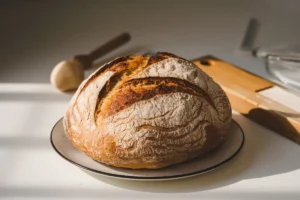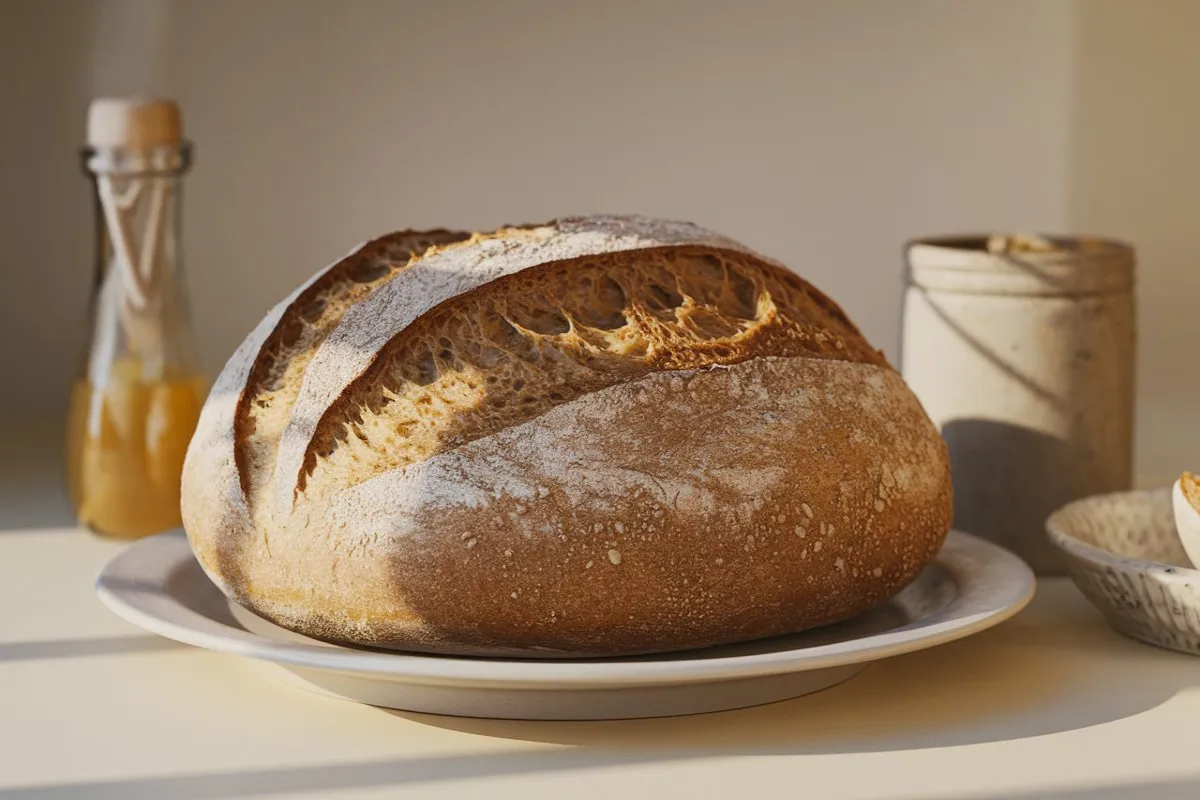Sourdough bread is popular not only for its taste but also for its potential health benefits. However, another part of the sourdough process often goes unnoticed: sourdough discard. This byproduct comes from maintaining a sourdough starter. While many throw it away, some are curious about its potential benefits, especially for gut health. In this article, we explore whether sourdough discard is good for your gut, its nutritional value, potential benefits, risks, and how to use it safely.
What is Sourdough Discard?
To understand sourdough discard, it’s important to know what a sourdough starter is. A sourdough starter is a mix of flour and water that captures wild yeast and bacteria from the air. This mixture ferments to create the base for sourdough bread. To keep the starter healthy, you need to feed it regularly with fresh flour and water. During this feeding process, you remove part of the starter. This removed portion is known as sourdough discard.
How Sourdough Discard is Created
The process of making sourdough discard is key to sourdough fermentation. When you feed a sourdough starter, you typically remove about half of it before adding new flour and water. This ensures the right balance of yeast and bacteria for fermentation. The portion you remove is the discard, which many people throw away, but it also has several uses in cooking and baking.
What is sourdough discard? explains the origins and uses of sourdough discard, showing that it isn’t just waste but a valuable byproduct.
Nutritional Profile of Sourdough Discard
Sourdough discard has a similar nutritional profile to the sourdough starter. It contains various macro and micronutrients that contribute to overall health when included in a balanced diet.
Macro and Micronutrients in Sourdough Discard
- Carbohydrates: The main nutrient in sourdough discard is carbohydrates, which provide energy. The yeast and bacteria in the starter break down some of these carbs during fermentation.
- Proteins: Sourdough discard also contains protein, which is important for muscle repair and growth.
- Fiber: Depending on the flour used, sourdough discard can be a good source of dietary fiber, essential for digestive health.
- Vitamins and Minerals: The discard provides important vitamins and minerals like B vitamins, iron, and magnesium, crucial for energy, oxygen transport, and muscle function.
Probiotics and Prebiotics in Sourdough Discard
One key benefit of sourdough discard is its probiotic and prebiotic content. Probiotics are beneficial bacteria that support a healthy gut, while prebiotics are fibers that feed these bacteria.
Is sourdough good for gut health? discusses the connection between sourdough and gut health, emphasizing the importance of probiotics and prebiotics in maintaining a balanced gut environment.
Potential Gut Health Benefits of Sourdough Discard
Probiotics from Sourdough Discard
- Probiotics are live microorganisms that improve gut health by enhancing the gut microbiota.
- The sourdough fermentation process involves various bacteria, including lactic acid bacteria, known for their probiotic properties. These bacteria help balance the gut by promoting the growth of good microbes.
- Regularly eating foods with probiotics, like sourdough discard, may improve digestion, boost the immune system, and even support mental health by affecting the gut-brain connection.
Prebiotic Fiber Content in Sourdough Discard
- Prebiotics are fibers that humans cannot digest, but they feed the probiotics in our gut.
- Sourdough discard contains prebiotic fibers, especially if you use whole-grain flours in the starter. These prebiotics promote the growth of good bacteria, crucial for a healthy digestive system.
- Including prebiotic-rich foods like sourdough discard in your diet can support digestive health by improving bowel regularity and reducing inflammation.
Digestive Enzymes in Sourdough Discard
- The fermentation process that creates sourdough discard also produces digestive enzymes. These enzymes break down food, making nutrients easier to absorb.
- Eating foods with natural enzymes, like those in sourdough discard, can improve digestion and may relieve issues like bloating and gas.
Risks and Considerations of Consuming Sourdough Discard
While sourdough discard has benefits for gut health, it also has risks. Consider these before adding it to your diet.
Potential Downsides of Sourdough Discard
- Digestive Discomfort: Some people, especially those not used to fermented foods, may experience digestive discomfort from sourdough discard. Symptoms might include bloating, gas, or stomach cramps.
- Allergies and Sensitivities: Sourdough discard usually contains gluten, which can cause problems for people with gluten intolerance or celiac disease. Even those without celiac disease but who are sensitive to gluten might feel adverse effects.
- Overconsumption Risks: Like any food, eating too much sourdough discard can lead to problems. Consume it in moderation and watch how your body reacts.
Who Should Avoid Sourdough Discard?
- Individuals with Gluten Intolerance or Celiac Disease: Unless made with a gluten-free starter, sourdough discard contains gluten, which can trigger symptoms in those with gluten-related disorders.
- People with Sensitive Stomachs: Those with sensitive digestion may find that the high fiber content and fermentation byproducts in sourdough discard cause discomfort.
- Anyone with Sourdough Sensitivity: Some people may be sensitive to sourdough in general, experiencing symptoms like bloating, gas, or headaches after eating it. These individuals should limit or avoid sourdough discard.
How to Use Sourdough Discard Safely

Best Practices for Incorporating Sourdough Discard into Your Diet
- Start Small: If you’re new to sourdough discard, begin with small amounts to see how your body reacts. This helps avoid potential digestive issues.
- Use in Recipes: Sourdough discard can be used in many recipes, like pancakes, waffles, crackers, and cookies. This not only reduces waste but also lets you enjoy the benefits of sourdough discard in different forms.
- Store Properly: Keep sourdough discard fresh by storing it in the refrigerator in an airtight container. It can last up to a week, but it’s best to use it soon for optimal freshness and flavor.
Cooking Techniques to Maximize Health Benefits
- Low-Temperature Cooking: Preserve the probiotics in sourdough discard by using cooking methods that don’t expose it to high heat. Low-temperature cooking, such as in pancakes or waffles, helps retain more of the live bacteria.
- Combine with Gut-Friendly Ingredients: Pair sourdough discard with other gut-friendly foods like whole grains, fruits, and vegetables. For example, sourdough discard pancakes with berries or discard-based flatbread topped with leafy greens can be both delicious and good for your digestion.
Comparison with Other Fermented Foods
Sourdough Discard vs. Other Fermented Foods
Sourdough discard is just one of many fermented foods that benefit your gut. Here’s how it compares to other popular fermented foods:
- Kefir and Yogurt: Both kefir and yogurt are rich in probiotics, like sourdough discard. However, they usually contain different strains of bacteria, with kefir offering more diverse probiotic strains. Sourdough discard may have fewer strains but still offers significant benefits.
- Kombucha: Kombucha, made from sweetened tea, is another probiotic-rich fermented food. It’s a refreshing, fizzy drink, while sourdough discard is solid and can be used in baking. Both can contribute to a healthy gut microbiome.
- Kimchi and Sauerkraut: These fermented vegetables are packed with probiotics and fiber, like sourdough discard. They also provide vitamins, minerals, and antioxidants from the vegetables used in their preparation.
Expert Opinions on Sourdough Discard and Gut Health
Nutritionists’ Views on Sourdough Discard
Many nutritionists and dietitians agree that sourdough discard can be a valuable part of a balanced diet, especially for those looking to improve gut health. The probiotics and prebiotic fibers in sourdough discard make it a functional food that supports a healthy digestive system.
Scientific Research on Sourdough Discard
Conclusion
Sourdough discard, often overlooked, holds potential benefits for gut health due to its probiotic and prebiotic content. However, like any food, it’s important to consume it in moderation and be mindful of any potential intolerances. Whether you’re a seasoned sourdough baker or new to the world of fermentation, adding sourdough discard to your diet could be a simple way to support a healthy gut.
By understanding the benefits and risks, you can make informed choices about how to include sourdough discard in your meals. Remember, the key to gut health is variety and balance, and sourdough discard can be a part of that equation.

